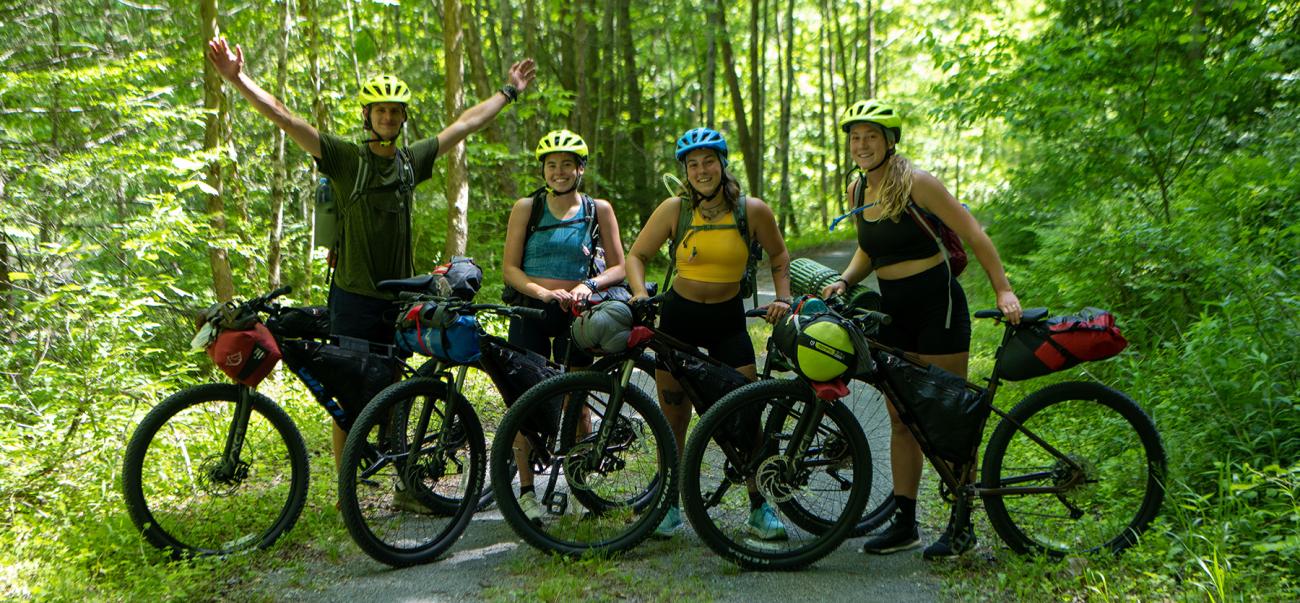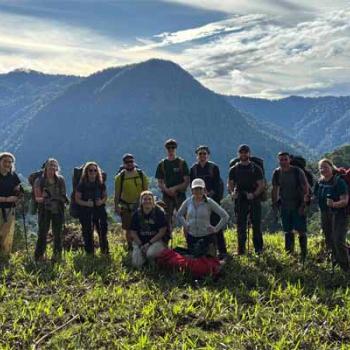The Outdoor Recreation and Education major combines traditional classroom experience with hands-on learning that aims to enhance students’ employability and connect students with outdoor recreation and education organizations within the industry.

Outdoor Recreation and Education
About the Major
Outdoor Recreation and Education focuses on preparing the next generation of professionals for the outdoor industry. The outdoor recreation economy generated $862 billion in consumer spending and 4.5 million jobs in the United States in 2021 (Outdoor Industry Association, 2023). Career opportunities in the outdoor industry can be found in the areas of conservation leadership in both the public and private sectors, nature-based travel and tourism, and outdoor adventure education, to name a few.
The major blends traditional classroom and field-based learning opportunities to create a unique educational experience for students in the major. General content areas in the major include outdoor leadership, environmental interpretation, parks and protected areas management, ecotourism, and adventure programming. In addition to these key content areas, students have opportunities to develop technical proficiency in various outdoor adventure pursuits, expeditionary and wilderness travel experience, and leadership and teaching ability that can be applied in a wide variety of professional contexts
Why OHIO's Outdoor Recreation and Education Major?
-
Experience
-
Location
OHIO's location in Athens, Ohio, offers students a picturesque college town experience with abundant year-round recreational activities such as hiking, cycling, backpacking, bouldering (indoor and outdoor), mountain biking, stand-up paddleboarding, canoeing, camping, wildlife viewing, and swimming. The program is conveniently situated in a region teeming with outdoor adventures, including nationally acclaimed spots like Bailey's Trail System (15 minute drive from campus) for mountain biking, Hocking Hills State Park (45 minute drive from campus) for hiking, and New River Gorge National Park (3 hour drive from campus) for climbing and whitewater paddling.
-
Graduate Success
Nearly 100% of OHIO Outdoor Recreation & Education majors find employment within the Outdoor Industry post-graduation. Employers of OHIO alumni include the National Parks Service, Ohio Department of Natural Resources, U.S Forest Service, Outward Bound, NOLS, YMCA, Camp Joy, Scouting USA, Naturalists At Large, Adventure Treks, Columbus Metro Parks, and many more!
Immersive Experiences
-
Outdoor LeadershipDesigned to help students develop the knowledge and expertise required for effective outdoor leadership, this course includes extended expeditions backpacking in Pisgah National Forest, sea kayaking along Cape Lookout National Seashore, and bike packing in the Allegheny Highlands.
-
Ecotourism Destinations: Costa RicaThis education abroad program is designed to provide students with opportunities to examine the principles and practices of ecotourism in action through a 10-day ecotourism experience in the world-renowned ecotourism destination of Costa Rica.
Career Opportunities
Graduates from the Outdoor Recreation Recreation and Education major are prepared to lead and excel in their profession!
Example Job Titles:
- Recreation Planner
- Adventure Program Coordinator
- Environmental Educator
- Assistant Director of Outdoor Pursuits
- Interpretive Guide
- Camp Director
- Challenge Course Program Coordinator
- Mountain Guide
- Ecotourism Resort Manager
- River Manager
- Outdoor Recreation Specialist
- Trail Director
- Outdoor Educator
- Naturalist (after interpretive guide)
Certificates
The Outdoor Recreation and Education major is complimented by a variety of certificate programs depending on an individual Bobcat’s interests. Potential pairings include:
Partners and Resources
-
Outdoor PursuitsOutdoor Pursuits takes you into the magnificent wilderness of Southeast Ohio, West Virginia, Kentucky, Minnesota and Pennsylvania. A wide variety of programs, facilities and adventure opportunities offer a chance to get involved at the level that fits your interests and abilities.
-
Outdoor Museum on the RidgesA new way to explore and learn! The OHIO Museum Complex features an Outdoor Museum transforming the vast network of trails at The Ridges and points of interest across the region into a unique integrated outdoor learning experience.
-
Baileys Trail SystemLocated in the Appalachian foothills of Southeast Ohio, the Baileys offers trails for every level of hiker, trail runner, and mountain bike rider.
-
Wayne National ForestLocated within a short drive of Athens, Ohio, the Wayne National Forest offers a wide variety of outdoor recreation opportunities, from mountain biking and horseback riding to camping, hiking, hunting, and fishing.
-
Ohio State ParksThere are multiple Ohio State Parks within a short drive of Athens, Ohio, including Hocking Hills State Park, Strouds Run State Park, and Lake Hope State Park, among others.
Costs and Financial Aid
When you choose OHIO, you’re getting the competitive tuition rates of a state university, but with the personalized attention and support you might expect from a private school. In fact, we've been named named the best value among Ohio’s public universities by U.S. News & World Report.
Tuition and fees are assessed based on the number of credit hours of enrollment, Ohio residency and program.
- See Tuition and Fees
Accreditation
The Parks, Recreation, and Leisure Studies program is accredited by the Council on Accreditation for Parks, Recreation, Tourism, and Related Professions (COAPRT). As an accrediting body, COAPRT is accredited by the Council on Higher Education Accreditation (CHEA).
2024 Annual Report
2023 Annual Report
2022 Annual Report
2021 Annual Report
More Information on the Parks, Recreation, and Leisure Studies Programs' Accreditation
Contact
If you have any questions, please reach out to:
Dr. Bruce Martin
Program Coordinator,
Parks, Recreation, and Leisure Studies
Patton College of Education
Patton Hall 202Q
Athens, OH 45701
740.593.4647
